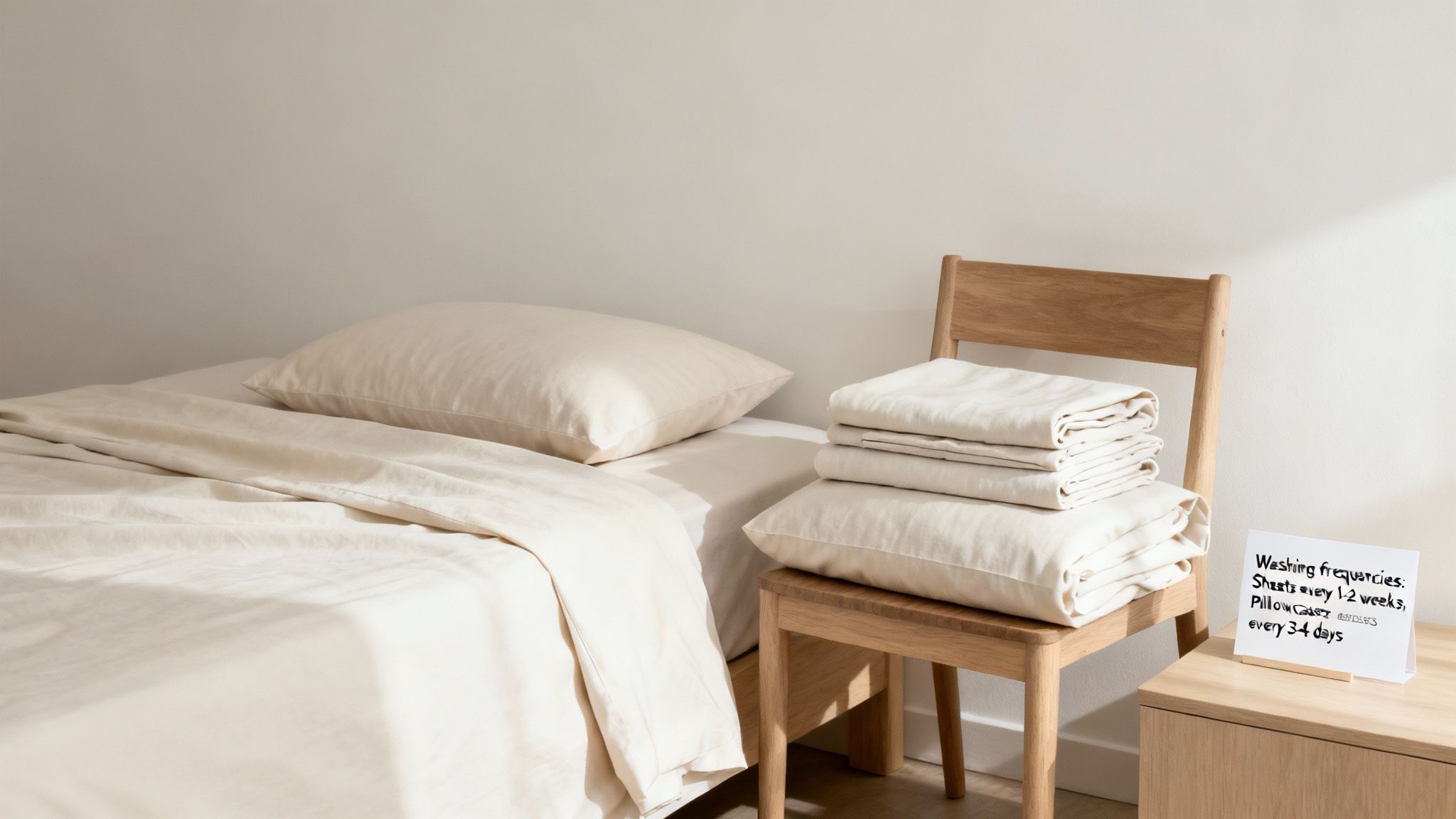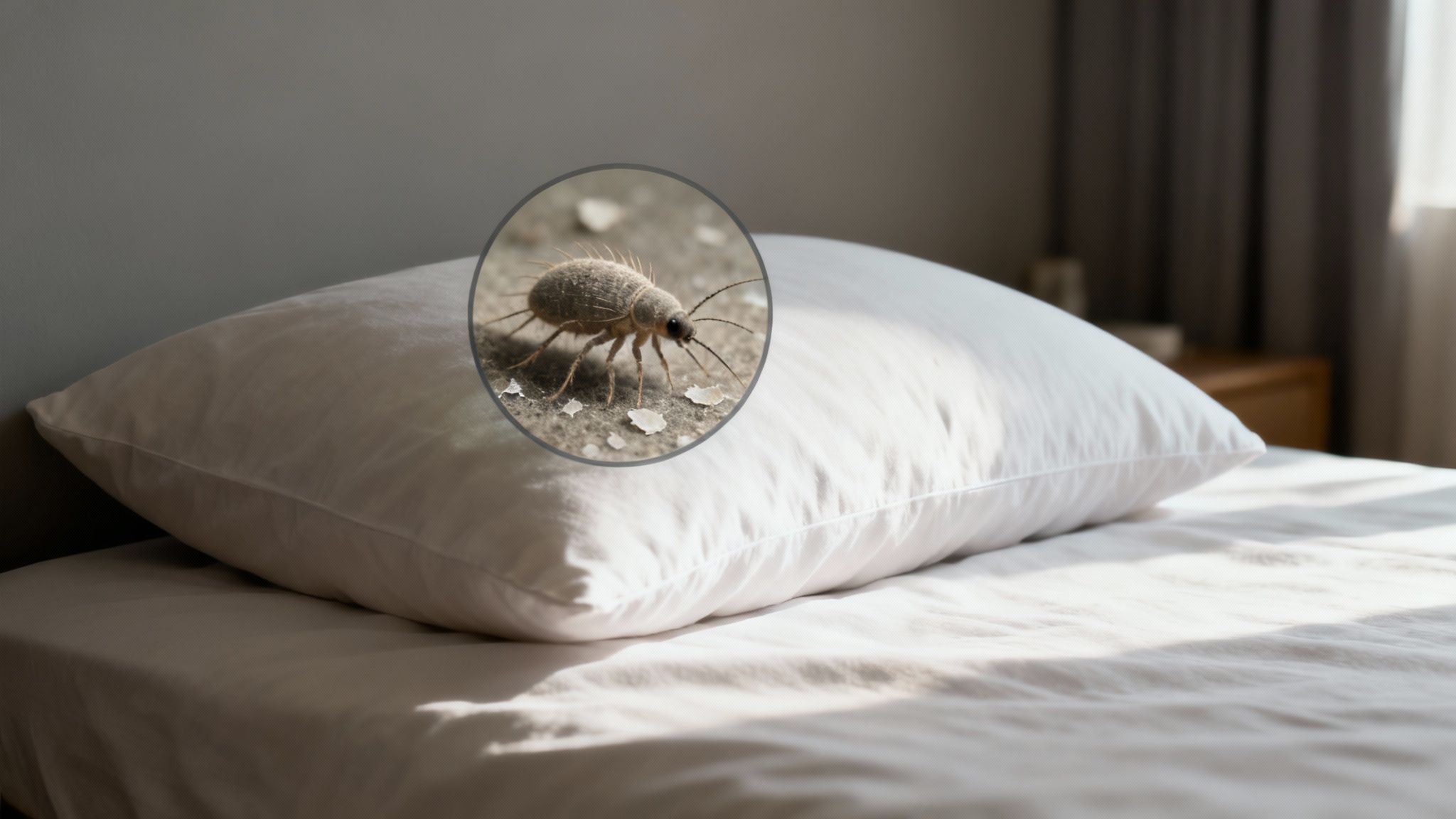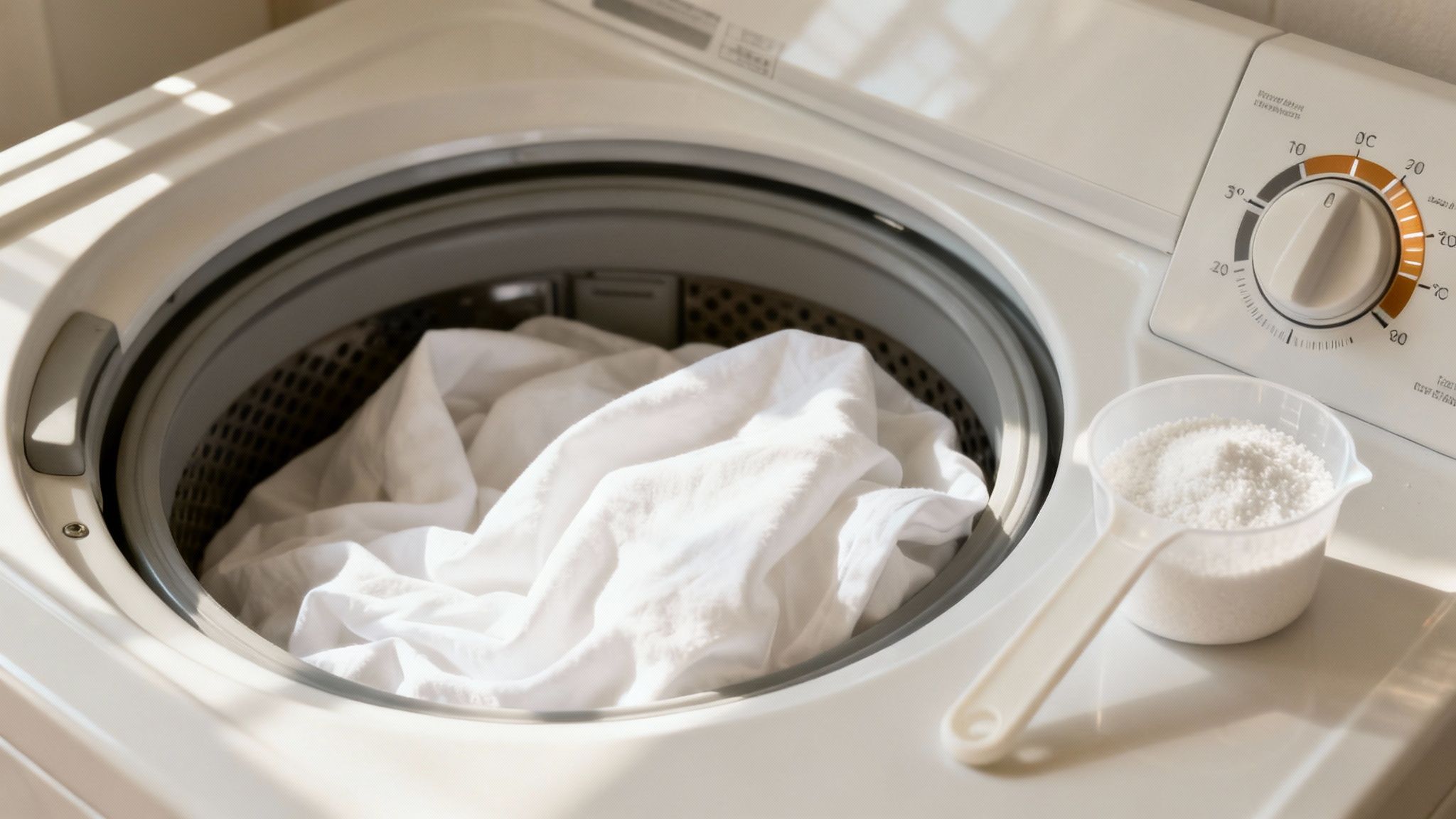How Often to Wash Bedding: A Complete Guide
- Sarah Huber
- Nov 2, 2025
- 9 min read
To keep your bed a clean and healthy place to rest, the general rule is to wash your sheets and pillowcases once a week. Every night, your bedding collects dead skin cells, natural body oils, and sweat. A simple weekly wash cycle is the best way to maintain a fresh sleep environment.
But what about everything else on your bed? Your complete bedding ensemble has its own ideal cleaning schedule.
Your Quick Guide to Washing Bedding

Knowing how often to wash each piece of bedding is the secret to a perpetually fresh bed. While your sheets and pillowcases need the most attention, items like your duvet cover, blankets, and pillows have their own cleaning schedules.
Establishing a consistent laundry routine does more than just keep things hygienic; it also helps your bedding last longer. Over time, oils and dirt can weaken fabric fibers, but regular, proper washing keeps them strong and comfortable.
Bedding Washing Frequency Cheat Sheet
To simplify things, here is a basic cheat sheet for a regular bedding laundry routine under normal circumstances.
Bedding Item | Recommended Washing Frequency | Key Considerations |
|---|---|---|
Sheets | Once per week | They're in direct contact with your skin all night, making a weekly wash essential for hygiene. |
Pillowcases | Once or twice per week | These collect facial oils and hair products. Wash them more often to help keep your skin clear. |
Duvet Covers | Every 2-4 weeks | If you don't use a top sheet or have pets on the bed, you may want to wash this more frequently. |
Blankets & Quilts | Every 2-3 months | This depends on use. A frequently used blanket might need a wash every month. |
Comforters | 2-4 times per year | Since they're usually protected by a duvet cover, these bulky items need less frequent deep cleaning. |
Pillows | 1-2 times per year | Washing pillows is key for removing dust mites and allergens that build up deep inside. |
This table provides a great baseline. However, factors like allergies, pets, sickness, or a hot summer may require you to wash items more often to keep your bed feeling truly clean.
What’s Lurking in Your Unwashed Bedding?

Regularly washing your bedding is more than just a luxury—it’s an important health habit. Every night, your bed collects microscopic debris, which is why knowing how often to wash your bedding is critical for your well-being.
As you sleep, your body sheds thousands of dead skin cells every hour. These cells, along with your natural body oils and sweat, are deposited right onto your sheets, creating an ideal environment for bacteria to flourish.
The Microscopic Ecosystem in Your Bed
Unwashed sheets can become a buffet for dust mites. These microscopic creatures feast on dead skin cells, and their waste products are a major trigger for indoor allergies and asthma. If you often wake up with a runny nose or itchy eyes, your bedding could be the culprit.
The buildup of sweat, skin cells, and oils provides the perfect breeding ground for bacteria. This can lead to skin problems like acne and other irritations, especially where contact with your bedding is constant.
It’s surprising how quickly this buildup occurs. We shed hundreds of thousands of skin cells and can produce significant sweat each night. You can find more insights into what grows in unwashed sheets on independent.co.uk.
From Unseen to Unhealthy
Over time, this microscopic environment can impact your health beyond allergy flare-ups. A dirty bed can affect your respiratory system and overall quality of sleep. The solution is simple: wash your bedding regularly to remove these irritants.
Washing effectively removes:
Allergens: It eliminates dust mite waste and other potential triggers.
Bacteria: It washes away microbes that can cause skin and respiratory problems.
Buildup: It gets rid of the oils and skin cells that feed this ecosystem.
By sticking to a consistent washing routine, you are actively creating a healthier space for yourself and your family.
A Washing Schedule for Every Bedding Item
Knowing when to wash your bedding is just as important as knowing how. A consistent schedule is needed to keep your bed truly clean. While washing sheets weekly is a great start, every item on your bed has its own timeline.
This item-by-item breakdown provides a clear, actionable plan for everything from your pillowcases to your mattress pad. Following these guidelines boosts hygiene and helps your favorite linens last longer.
Sheets and Pillowcases: The Weekly Essentials
Your sheets and pillowcases are in direct contact with your skin all night, absorbing sweat, body oils, and dead skin cells. This direct contact is why they need the most attention and should be washed at least once a week.
Studies have found that after just one week, a pillowcase can be full of bacteria from your skin and hair. You can learn about the science behind weekly washing on time.com, but the main point is that weekly washing is essential for a hygienic bed.
Duvet Covers and Blankets: The Middle Ground
Your duvet cover acts as a shield for your comforter, so it typically needs less frequent cleaning. A good rule of thumb is to wash your duvet cover every two to four weeks. If you sleep without a top sheet or if pets share the bed, consider washing it weekly.
As for the blankets and quilts you use regularly, aim to wash them every two to three months. If you have a favorite blanket for napping, you might want to increase that to monthly to keep it smelling fresh.
Comforters, Pillows, and Mattress Pads: The Deep-Clean Crew
These bulky items are often forgotten, but a periodic deep clean is crucial for getting rid of dust, allergens, and bacteria.
Comforters: Since a duvet cover does most of the protective work, your comforter only needs a thorough wash two to four times a year. A professional laundry service is often the best choice for these bulky items. You can learn more about comforter cleaning in the Phoenix area.
Pillows: Your pillow absorbs sweat, oils, and saliva every night. Washing them twice a year is a must to get rid of dust mites and allergens that work their way deep into the filling.
Mattress Pads/Protectors: This layer is your mattress's last line of defense. To keep your sleep setup hygienic, wash your mattress protector every one to two months.
By sticking to this schedule, you can rest easy knowing that every layer of your bed is clean, fresh, and ready to provide a great night's sleep.
When You Need to Wash Your Bedding More Often
The once-a-week rule for washing sheets is a great starting point, but it isn’t a one-size-fits-all solution. Certain situations require you to wash your bedding more often to keep your sleep space clean and healthy.
Allergies, pets, sickness, and even the intense Phoenix heat can lead to a faster buildup of sweat, bacteria, and allergens. Learning to spot these triggers is key to creating a laundry routine that works for you.

Your personal habits and health have a direct impact on your laundry needs, often meaning you’ll need to wash items more frequently than standard advice suggests.
Managing Allergies and Asthma
If you struggle with allergies or asthma, your bed can quickly become a source of triggers. Dust mites, pollen, and pet dander can settle into bedding fibers, which can disrupt your sleep and leave you feeling unwell.
To keep allergens at bay, try washing your sheets and pillowcases twice a week in hot water. The high temperature is your best weapon against dust mites, as it kills them and washes away their waste. This change can make a significant difference in reducing nighttime congestion.
Sharing Your Bed with Pets
Many of us love snuggling with our pets, but they bring hair, dander, and dirt into the bed. All of that gets trapped in your bedding and can affect air quality and hygiene.
If your pet is a regular sleep companion, plan on washing your bedding every 3-4 days. This will keep the buildup of pet dander under control and ensure your bed stays fresh for everyone.
Recovering from an Illness
When someone in your home gets sick, your bed can become a reservoir for germs and viruses. To stop germs from spreading and create a clean space for recovery, you’ll need to adjust your laundry schedule.
During and right after an illness, wash the sick person's bedding daily or every other day until they feel better. Use the hottest water setting the fabric can handle to properly sanitize everything. This helps kill lingering pathogens and prevent reinfection.
A proactive laundry schedule is one of the simplest yet most effective ways to create a healthier home. By tailoring your washing frequency to your specific needs, you actively reduce exposure to irritants and germs.
These factors can change the standard washing advice. Here’s a quick look at how recommendations shift based on your lifestyle.
When to Wash Your Bedding More Often
Factor | Standard Frequency (Sheets) | Adjusted Frequency (Sheets) |
|---|---|---|
Allergies or Asthma | Once per week | Every 3-4 days |
Pets in the Bed | Once per week | Every 3-4 days |
Illness (Cold, Flu) | Once per week | Daily or every other day |
Night Sweats or Hot Climate | Once per week | Every 2-3 days |
Acne or Sensitive Skin | Once per week | Every 2-3 days (pillowcases) |
Being flexible and washing your bedding more frequently when needed is the best way to keep your bed a clean, comfortable, and healthy retreat.
How to Wash Your Bedding for a Perfect Clean

Knowing when to wash your bedding is half the battle; knowing how delivers that fresh, clean feeling. A few simple techniques can make a significant difference, helping you kill germs and extend the life of your linens.
The goal is to ensure your bedding is hygienically fresh. That means using the right settings and products to get rid of sweat, body oils, and allergens.
Select the Right Water Temperature
Choosing the best water temperature requires balancing sanitation with fabric care. While cold water is gentle, it may not be sufficient to kill certain germs.
Warm Water: This is your go-to for most regular washes. It effectively cleans away everyday dirt and oils without being too harsh on the fibers.
Hot Water: Reserve this for specific situations. Hot water is ideal for sanitizing bedding after an illness or for eliminating dust mites if you struggle with allergies.
Pre-Treat Stains and Use the Right Detergent
Before you start the machine, check your bedding for any spots or stains. Applying a stain remover directly to a spot and letting it sit for at least 15 minutes before washing can be very effective.
When adding detergent, remember that less is often more. Using too much can leave behind a residue that makes sheets feel stiff. For different materials, it helps to understand the basics of caring for special fabrics.
A 2023 survey revealed a surprising gap in laundry habits, finding that many people do not wash their sheets weekly. Experts agree that washing bedding regularly is directly tied to better skin, health, and well-being. You can find more of these insights on bedding hygiene on the-independent.com.
Ensure Proper Drying
Getting your bedding completely dry is just as important as the wash cycle. Overloading the dryer can lead to damp spots and wrinkles. It's best to dry bulky items like comforters one at a time.
For an extra fluff factor, toss in a few wool dryer balls to help circulate air and dry everything more evenly. Stick to a low or medium heat setting, as high heat can cause shrinkage and wear on fabric fibers.
Get Perfectly Clean Bedding Without the Hassle
Stripping the bed, washing multiple loads, and wrestling a bulky comforter is a time-consuming chore. This is where a professional laundry service becomes a practical, time-saving solution that helps you reclaim your weekend.
GoGet My Laundry offers a simple, reliable service for residents throughout the Greater Phoenix area. We handle everything from delicate pillowcases to heavy comforters, providing an expert clean so you can focus on other things.
The Easiest Way to Do Laundry
We designed our process to be as convenient as possible. Our free pickup and delivery for residential customers means you no longer have to plan your day around laundry. Plus, our next-day turnaround ensures your fresh bedding is back home quickly.
If you're struggling with stubborn smells, we have tips in our guide on how to remove odors from laundry. With residential wash and fold services starting at just $1.69 per pound, getting your bedding professionally cleaned is affordable and convenient.
Experience the easiest way to do laundry — book your pickup now at www.gogetmylaundry.com.
Common Questions About Washing Bedding
To wrap things up, here are answers to a few common questions about bedding care. Getting these details right can help your linens last longer and give you confidence in your routine.
Can I Wash All My Bedding Items Together?
It's tempting to put everything into one load, but separating items yields better results. At a minimum, group things by color and fabric type to prevent damage and lint transfer.
When it comes to bulky items like comforters or blankets, they need their own space. Giving them a dedicated load ensures they have enough room to tumble and rinse completely.
What Is the Best Way to Store Clean Bedding?
How you store your bedding is just as important as how you wash it. The goal is to keep it fresh and ready for use. A cool, dry, and well-ventilated spot like a linen closet is your best option.
Avoid storing linens in plastic containers for long periods, as plastic can trap moisture and lead to mildew. A helpful trick is to fold a complete sheet set and tuck it inside one of its pillowcases to keep everything organized.
One of the biggest mistakes is putting away bedding before it’s 100% dry. Even a small amount of dampness can cause mildew, so ensure items are completely dry before storing.
Does My Mattress Type Affect Washing Frequency?
Not really. Whether you sleep on memory foam, latex, or an innerspring mattress, your body still sheds skin cells and produces sweat. These are the things you're washing away, regardless of your mattress type.
However, using a quality mattress protector is important for any mattress. Think of it as a washable shield that guards against spills, allergens, and dust mites. Wash the protector every one to two months to keep your entire sleep setup clean.
Keeping up with a consistent laundry schedule for all your bedding can feel like a full-time job. For a professional clean without the hassle, let GoGet My Laundry take care of it for you. We offer affordable laundry services with free pickup and delivery throughout the Phoenix area.
Article created using Outrank

Comments